Good chemistry: how chemistry students expand their skill set through hands-on, experiential learning
Whether you talk to a graduate or undergraduate student in the Department of Chemistry about why they study the field, their responses all evoke the same sentiment: a curiosity for the world and a desire to discover the unknown.
All students can fulfill this desire by attending classes and learning from knowledgeable faculty members. However, at Vanderbilt, students are also able to dig deep and participate in unparalleled hands-on experiential learning and research opportunities.
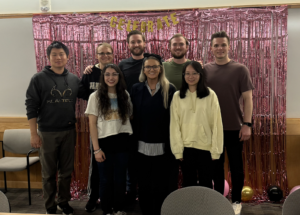
This past academic year, seven graduate students and one undergraduate student participated in the 2025 Merck Compound Challenge. Created in 2018, the competition gives teams from around the world 48 hours to create a proposed route of chemical steps from a commercial chemical they believe will make the final compound.
“It’s like dropping a pin on a map of Tennessee and asking teams to figure out the best way to get there,” said Jeff Johnston, Stevenson Professor of Chemistry. “Some may use a unique combination of car, bike, motorcycle, hiking, and approach from the east, while another team may use a plane, parachute, and hiking and approach from the south.”
Each team’s proposal is then peer reviewed by the other teams, as well as competition officials, and the top routes are tested for feasibility. Vanderbilt’s team, the Magic Methyls, has participated in the challenge since its inception, and this year they placed fifth out of nearly 300 teams worldwide.
“I was driven to apply for the competition because I enjoy problem-solving and using my scientific knowledge to devise clever solutions to particularly challenging syntheses,” said Melanie Padalino, a chemistry Ph.D. student in Johnston’s lab and the team lead.
Padalino chose chemistry as an undergraduate because she was driven to discover new things and wanted to have a positive impact on society. When reflecting on the challenge, she said her Vanderbilt classes helped prepare her and her teammates through weekly problem set sessions designed to build their repertoire of chemistry knowledge.
“Your chemical intuition grows over time as you become more experienced, but it is largely cultivated by your mentors” she said. “I was lucky enough to have outstanding chemistry professors at both my undergraduate institution and Vanderbilt, so I credit a lot of what I know to them.”
Johnston said learning opportunities such as the competition allow students to experience first-hand what their future professions may entail. The same holds true for research programs such as the Beckman Scholars Program (BSP).
Funded by the Arnold & Mabel Beckman Foundation, the program supports promising young students at premiere research institutions nationwide through 15 months of dedicated research in a laboratory under the guidance of a faculty member. As part of the program, scholars and mentors work on a focused research problem and publish their findings in scientific journals.
Vanderbilt currently has four scholars who are all working on various chemistry and/or biology-focused research projects over the summer.
Galen Wei, a senior double majoring in chemistry and computer science, is collecting enzymology data alongside Assistant Professor of Chemistry Zhongyue (John) Yang, with the goal of building and predicting more efficient enzymes.
“I applied for the opportunity to conduct research and meet like-minded individuals,” Wei said. “I think that conducting research for the betterment of human knowledge is a noble cause, and the Beckman Scholars Program was a great way to conduct research and to continue to conduct research after graduation.”
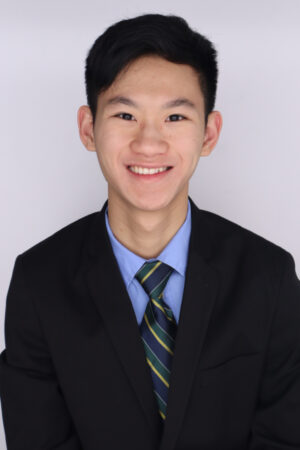
Tammy Le, a senior majoring in molecular and cellular biology, is studying the Receptor for Advanced Glycation Endproducts (RAGE) transmembrane receptor, a protein that plays a crucial role in various biological processes and disease states, and the development of its inhibitors. Working alongside Professor of Chemistry Walter Chazin, she is utilizing techniques such as virtual screening and fragment-based drug design.
“Being able to participate in this type of research as an undergraduate is not a common opportunity for all students nationwide,” Le said. “VU BSP has allowed me to learn more about research and foster an appreciation for it. I have been able to attend conferences and community-building events, which has allowed me to connect and build a community in STEM.”
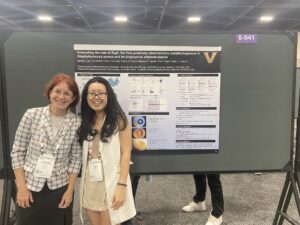
Ahmed Imami, a senior majoring in biological sciences, is working with Cornelius Vanderbilt Chair in Biological Sciences Laurence Zwiebel to develop a next-generation, volatile excito-repellent against Anopheline mosquitoes, which transmit the pathogens responsible for malaria.
“Participating in VU BSP has enabled me to collaborate with various researchers who are also part of the program,” Imami said. “I have had the pleasure of presenting this research at multiple conferences and attended the Beckman Summer Symposium to discuss my work with other Beckman Scholars. It has been great to hear different perspectives and viewpoints on the research.”
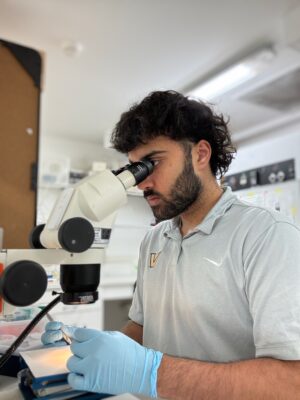
William Kim, a senior majoring in chemistry, researches the synthesis of complex natural products of high biological relevance with Assistant Professor of Chemistry Daria Kim. This work enables easier access to important chemicals, while also increasing the knowledge of chemical reactivity for many fields.
“I decided to apply to the Beckman Scholars Program as I found it to enable the longest and most involved development of scientific skills,” Kim said. “Beginning research, and specifically research in organic chemistry, I realized that there are a lot of techniques and skills to learn, so two summers and an academic year under VU BSP would greatly foster the development of those skills.”
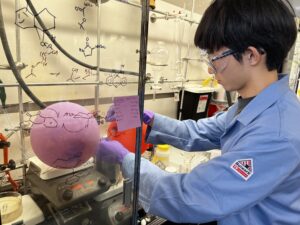
Through both experiential learning and research opportunities like these, students gain valuable scientific and communication skills, while also growing their network and learning from experienced members in the field.
“Vanderbilt houses world experts in their disciplines within chemistry and biological sciences,” Johnston said. “These faculty mentors provide a unique opportunity for Vanderbilt undergraduates to learn from the best trainees while contributing to creative solutions for pressing scientific problems. Their role in the final discoveries can take many forms, but their work as part of a scientific team often equates to high impact publications that advance the field.”
